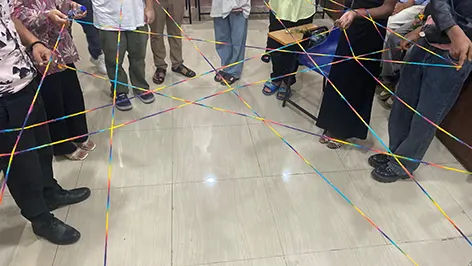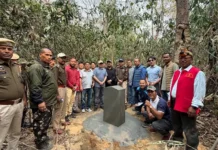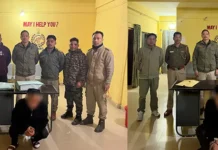ITANAGAR, 4 Aug: Around 30 queer-trans individuals and allies from the Itanagar Capital Region came together to share their personal stories and explore ways to combat isolation within their communities during the AP QueerStation’s 8th community meetup here on Sunday.
The event, themed ‘Queer-Trans Loneliness’, served as a safe space to unpack the often-silent struggles of loneliness, something experienced deeply by queer and trans persons due to various social, familial, and personal challenges, the AP QueerStation said in a release.
Gedam Ete, a practicing mental health professional, spoke about the essential connection between mental health and self-care.
Ete emphasized that taking care of one’s emotional and mental wellbeing starts with accepting oneself, understanding one’s emotions, and nurturing self-love.
She added that resilience is not built in isolation but thrives in connection.
“Support from friends, family, or even one empathetic person can significantly improve mental resilience,” Ete said. She encouraged the community to seek out these support systems instead of internalizing pain, as shared emotional experiences often act as the first step towardshealing.
Sawang Wangchha, founder of AP QueerStation, spoke on how loneliness manifests in the queer-trans experience, whether through family rejection, failed relationships, or simply feeling disconnected from society due to one’s identity. He pointed out that such emotional voids can lead many individuals into depression, anxiety, and long-term mental health challenges.
Wangchha also stressed the importance of taking a holistic approach to health, encouraging participants to pay attention not just to mental wellness but also to physical and sexual health.
“In many cases, individuals resort to coping mechanisms such as substance use, unsafe sexual practices, or emotional withdrawal, largely due to the lack of proper counselling and community support,” he observed.
“These coping strategies, though temporary, often put individuals at higher risk, especially in contexts where access to healthcare and information is limited,” Wangchha said. He called upon community members to come forward, share their stories, and help in creating a space that is empowering, healing, and non-judgmental.
Adding a public health dimension to the discussion, Nido Tuluk, project coordinator at CSC 2.0 (Care and Support Centre) under the SSHAKTI initiative, presented the key services offered through the programme. Run by ArNP+ and supported by the National AIDS Control Organization, the initiative aims to reduce lost to follow-up cases among people living with HIV, offer emotional and mental health support, and conduct outreach among high-risk groups.
He also noted their dedicated work with pregnant positive women, ensuring they receive consistent care throughout pregnancy and beyond. Tuluk encouraged queer-trans individuals to access these resources without hesitation, as these services are designed to support the most vulnerable with confidentiality and dignity.
An open-floor discussion was also held, where many participants shared their personal journeys, stories of dealing with loneliness, other struggles and how community connections have helped them stay grounded. The participants also exchanged ideas on how to build stronger peer networks and ensure continued outreach to those who may still be isolated.
The meetup was supported by Impression Institute, Itanagar and Mariwala Health Initiative.



